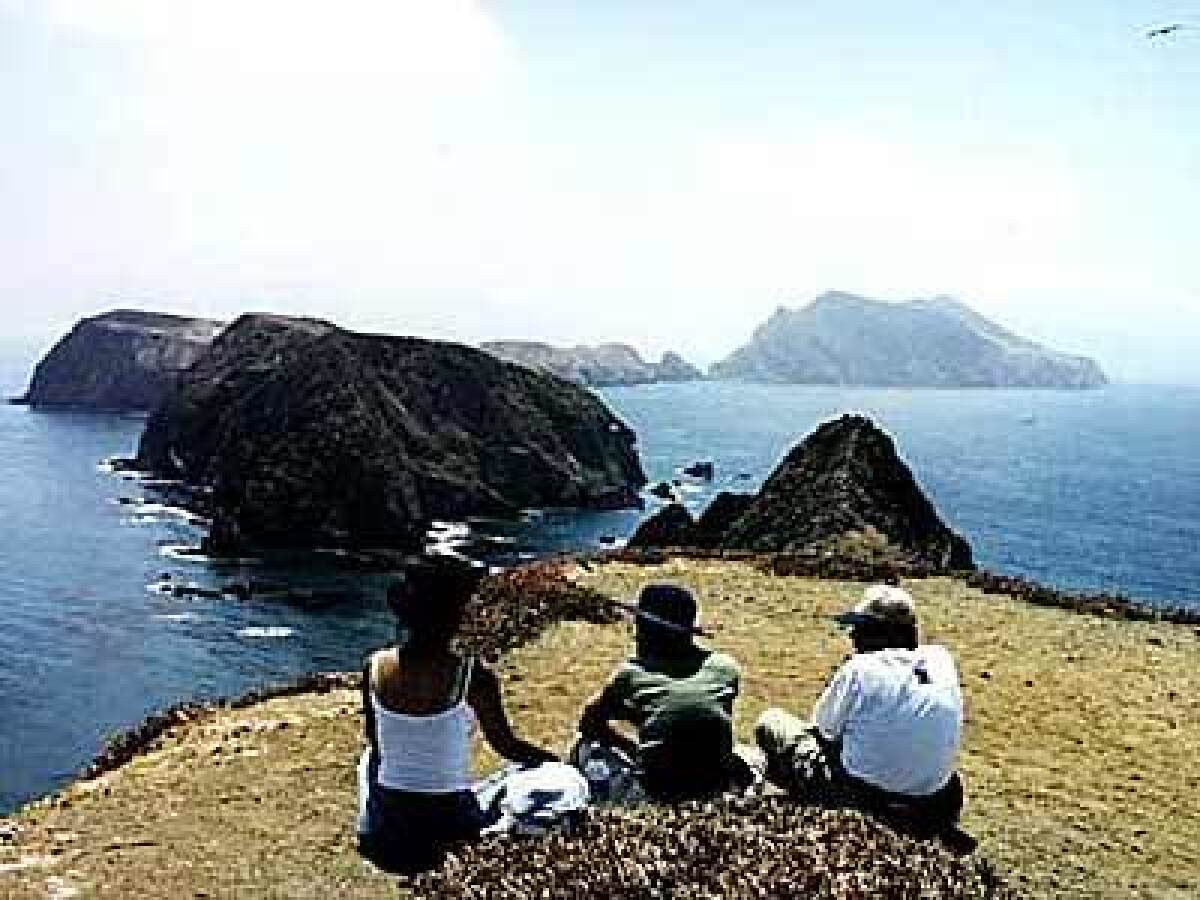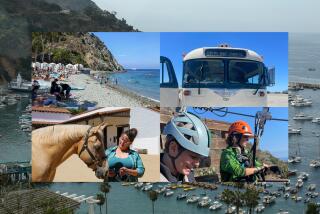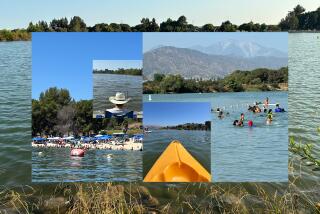A Channel Islands-Hopping adventure

CHANNEL ISLANDS NATIONAL PARK — We had been flying over water for about 20 minutes when the fog suddenly cleared and Santa Rosa Island appeared, its hills golden in the morning sunlight. The tiny plane banked and leveled out to land. As it eased down, a dirt runway came into view, filling the cockpit window in front of us. Then we were on the ground, gently bumping along the makeshift landing strip.
The pilot shut down the engines, and there was silence. For just a moment.
“Twenty-six miles across the sea,” warbled a friend from the seat behind me, “Santa Catalina is a-waiting for me ... “
“Wrong island,” another friend scoffed, cutting him off.
All of us laughed. Definitely the wrong island.
Like Catalina, Santa Rosa is part of the Channel Islands group, a string of eight islands off the coast of Southern California. But that is where the comparison ends.
Catalina has 10,000 visitors on a good weekend. Santa Rosa may have a dozen. Then again, it may have none.
On a Saturday in June, fewer than a dozen of us--my group and a few fishermen--were visiting.
My friends and I had decided to embark on an all-islands weekend in the Santa Barbara Channel. We had planned to stay in Ventura and take day trips to Santa Rosa and Anacapa, two of the five islands that make up Channel Islands National Park.
Santa Rosa, 44 miles from the mainland, is occasionally visited by charter boats: Truth Aquatics in Santa Barbara and Island Packers in Ventura. But it’s a long trip and may be canceled if enough people haven’t booked the voyage. The most dependable way to traverse the channel is as we did, on a 10-seat twin-engine plane flown by Channel Islands Aviation out of Camarillo.
If you can piece together a group of at least six friends or family members for the plane ride, you may have the 15-mile-long island mostly to yourself. The round-trip cost is $106 for adults, $84 for children. Stay for a day--or longer if you like to camp. But don’t expect amenities. Visitors must bring their own food, water and shelter.
As we left the plane, pilot Eric Burg recommended a beach walk and pointed out a trail. Then he said he would return to pick us up in six hours. He started the engines of the noisy Britten Norman Islander and lifted off, bound for the mainland.
We strolled off the runway, bound for a beach.
It didn’t take long. Within 10 minutes we emerged on a thin strip of sand that seemed to stretch as far as we could see. There were no footprints, no litter, no people--just driftwood and shells and rocks. A strong scent of kelp filled our nostrils, and we could hear the lazy crash of the surf.
Behind us, 20-foot sand dunes were stacked up against the sandstone cliffs that line the beach. The only marks on them were soft ridges and swirls carved by the wind.
The sea was azure in the shallows, gradually deepening to dark blue on the horizon. About 50 sea gulls stood their ground at the tide line, undisturbed by our invasion.
We marveled at the scene and congratulated ourselves on finding such tranquillity so close to home. Then we ambled up the beach, heading for a tumble of volcanic rocks and tide pools.
Santa Rosa ranges from steep canyons and grass-covered rolling hills to the beach we were exploring. Once the home of Chumash Indians, the island is considered a treasure of archeological sites, some dating back 12,000 years.
There are Torrey pines, a coastal lagoon and plants and animals found nowhere else on Earth. At one time, flightless geese and pygmy mammoths strolled here.
Unfortunately, our six hours of island isolation vanished long before we were ready to leave. Before we knew it, we heard--then saw--Burg’s plane approaching. Tired and sunburned but grateful for the experience, we reluctantly boarded and returned to the mainland.
The Four Points by Sheraton hotel sits near the Channel Islands National Park Visitor Center at sleepy Ventura Harbor. Friday night I had been checked into a room that wasn’t made up. I was moved twice and finally ended up in a clean and comfortable room ($99 plus tax per night). Unfortunately, it was over the bar. The desk clerk assured me, however, that the loud music would end at midnight. And it did. The same desk clerk assured us we could eat in the hotel restaurant, Alexander’s. But it closed early that night.
So we scouted the harbor and happened upon the Scotch and Sirloin, a clubby-looking restaurant with lots of plants, burnished mahogany and burgundy overstuffed booths overlooking the marina.
It was a pleasant surprise. Despite the late hour, the sourdough bread was warm, the prime rib was rare and the sirloin soup was steaming and hearty. True to its name, the restaurant offered 31 single-malt scotches.
After our return from Santa Rosa on Saturday, we followed a friend’s recommendation and ate at Tipps Thai Cuisine in Old Town Ventura. Again we were pleased. Tipps, a small storefront restaurant, had a line outside. But the time went quickly, and soon we were enjoying excellent curries, pan-fried Thai noodles and tom kha gai, a chicken coconut soup served in a flaming dish. The family-owned restaurant has been a stalwart on Main Street since 1983.
Day Two of our island-hopping adventure dawned clear and bright. Our destination was Anacapa, a rugged mass of steep volcanic cliffs, lava tubes and sea caves. Only 14 miles from the Ventura County coast, it offers the easiest access to the national park. Nearly 100,000 people explored it last year.
Like most visitors, we arrived via an Island Packers charter boat, which sails to Anacapa almost daily during the summer from Oxnard Harbor ($37 for adults, $20 for children). We boarded the Vanguard, a 65-foot converted fishing boat, at 9:30 a.m., and by 11 we were nearing the island. It was a perfect day on the water: small seas, an absence of whitecaps and lots of marine life--sea lions, cormorants and, best of all, several small pods of dolphins.
Anacapa has only about a square mile of land, but it is spread over about a five-mile span. From a distance, it appears to be a dramatic spine of rock protruding from the sea, but as we drew closer we could see it has eroded into three small islands, East, Middle and West Anacapa.
In 1932 the Coast Guard erected a lighthouse on East Anacapa. It was on this island that the Vanguard landed. The next part of the journey may have been the hardest: We climbed 154 steps to reach the crown of the island.
But the view from the top was stunning. And the wildlife made people giggle. We had arrived on Anacapa during the height of the breeding season for the Western gull. Thousands of them were sitting on eggs or watching their fuzzy, brown- and tan-speckled babies toddle around. They were everywhere, and if you got too close, the birds scolded you. We learned from park ranger Dave Begun that the baby gulls remain on Anacapa, learning to fly, through mid-August. Then they will move on, many of them to the mainland.
Because of its lack of water, Anacapa presents a desolate landscape. But conditions that make the island seem stark to humans make it particularly attractive to seabirds and marine life. Anacapa has the largest brown pelican rookery on the Pacific Coast.
As we stood on the edge of the cliffs overlooking the sea, we could see leopard sharks patrolling the clear, shallow waters far below. Long arms of giant kelp swayed in the current. Above us, the sky was clear, blue and smog-free.
Once again, we congratulated ourselves.
Rosemary McClure is an editor in the Travel section.
More to Read
Sign up for The Wild
We’ll help you find the best places to hike, bike and run, as well as the perfect silent spots for meditation and yoga.
You may occasionally receive promotional content from the Los Angeles Times.






